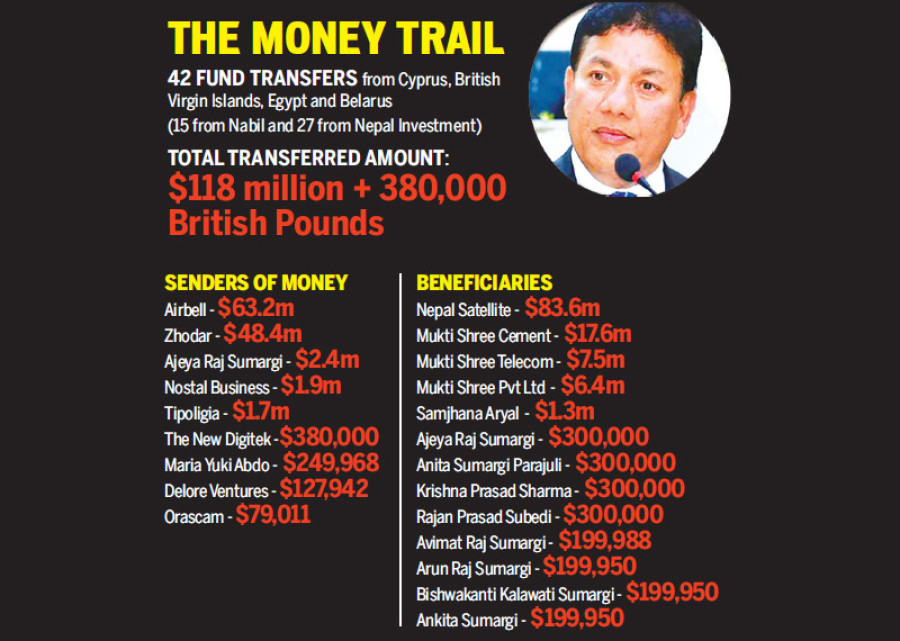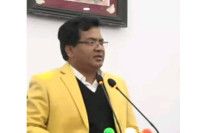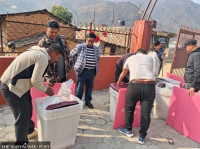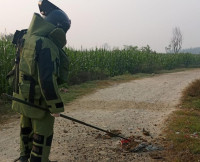National
Sumargi firms laundered Rs9b into Nepal: Govt report
Controversial businessman Ajeya Raj Sumargi and firms affiliated to him have brought around Rs9 billion illegally to Nepal through ‘suspicious companies’ based in tax havens, signalling involvement in shady business deals.
Rupak D. Sharma
Controversial businessman Ajeya Raj Sumargi and firms affiliated to him have brought around Rs9 billion illegally to Nepal through “suspicious companies” based in tax havens, signalling involvement in shady business deals.
This has prompted the Department of Money Laundering Investigation to thoroughly scrutinise business transactions and assets of Sumargi and his family members. But it is not known whether the department’s investigations will make any headway, as insiders, who are associated with Sumargi, say some powerful leaders of major political parties are involved in these deals and they will do everything to protect Sumargi.
Sumargi and his companies have so far received $118 million (approximately Rs12.1 billion as per Wednesday’s exchange rate) and 380,000 British pounds (around Rs52.6 million) from “suspicious companies” based in British Virgin Islands, Cyprus, Egypt and Belarus, shows a preliminary government report, a copy of which has been obtained by the Post.
This money, most of which is in the form of loans, started entering the country as early as January 2008 via Nabil Bank. Since then, Nepal Investment Bank has also been used for fund transfers, which continued till November 2013.
Of the money that entered Nepal, only $28.5 million (approximately Rs2.9 billion) forwarded to the accounts of Nepal Satellite Telecom and Mukti Shree Cement at Nepal Investment Bank has been frozen due to the firms' inability to submit required documents. Sources said a portion of funds that landed at Nabil Bank has also been frozen, but the Post could not confirm the amount. This means a big chunk of money transferred to bank accounts of Sumargi and his firms has entered the domestic market.
The beneficiaries of 97 percent of the funds remitted from abroad are four companies owned by Sumargi — Nepal Satellite Telecom, Mukti Shree Pvt Ltd, Mukti Shree Cement and Mukti Shree Telecom. But only Mukti Shree Cement and Nepal Satellite have sought permission from authorities to bring in foreign investment, that too for mere $30.9 million (approximately Rs3.2 billion), according to the report prepared by the Department of the Money Laundering Investigation , the Central Investigation Bureau of Nepal Police and the Nepal Rastra Bank.
This implies $87.1 million and 380,000 British pounds (approximately Rs9 billion) were brought into the country without getting a nod from concerned authorities.
“This is sheer violation of laws, as the central bank has made it mandatory for companies acquiring foreign loans to seek its permission prior to bringing them into the country,” says the report, adding, “Companies and individuals that received funds from abroad also did not have foreign currency accounts at banks.”
Sumargi and his firms have received a big chunk of money — $63.2 million, or 53 percent of total transfers — from Cyprus-based Airbell Services. Zhodar Investments Limited, a company based in British Virgin Islands, as per latest data, has remitted $48.4 million, or 41 percent of the total amount, making it second biggest fund supplier for Sumargi and his firms.
The government has misgivings about status of these companies, as it has not been able to “trace their owners or ascertain their capability to make investments of that scale in Nepal”.
“It is also not known why foreign companies expressed willingness to transfer millions of dollars to Nepali individuals, who are not related to them,” says the report. “This is an indication that Sumargi may have formed shell companies in tax havens; transferred ill-gotten wealth from Nepal; and remitted the money back to the country in the name of investment and loans to cleanse the dirty funds.”
This has raised the spectre of further intensification of capital flight in the future, as suspected “shell companies” will demand interest on money sent to the country in the form of loans. These companies will also demand dividend if the money was transferred to the country in the form of investment. This, authorities fear, will bleed the country’s foreign exchange reserves dry. This may also cause more ill-gotten wealth to leave the country through the formal channel in the form of so-called interest and dividend, turning Nepal into a hotbed for financial crimes such as money laundering, senior officials of the Nepal Rastra Bank said on condition of anonymity.
Money laundering is generally carried out in three steps: placement, layering and integration. First, the illegally gotten wealth is transferred to shell companies, banks or casinos. The wealth is then channelled into the formal economy or genuine businesses in the form of investment or credit. Then jobs are created and taxes are paid to show earnings were made in a genuine manner.
“Sumargi appears to have followed these procedures,” says the report.
This calls for the need to appoint an investigation officer, as per the provision in the Money Laundering Prevention Act, to investigate assets owned by Sumargi and his family members in the country, adds the report.
“We have already appointed investigation officers and are taking help of police officers, government officials and our embassies and consulates based abroad to gather more information and evidences,” said Jiwan Prakash Sitaula, director general of the Department of the Money Laundering Investigation. “This is a critical case and we are trying to make sure there is no loophole.”
Ironically, the department has been saying this for quite some time, but has failed to produce concrete results. Highly-placed sources told the Post that the department will not be able to expedite its investigation unless there is strong political will and the finance minister can play a crucial role in moving things forward.
“We have known for a long time that Sumargi had deep financial links with powerful leaders of the Maoist party,” said a source, who suspects that Sumargi has since established financial links with Nepali Congress leaders as well. “These people will continue to protect him.”




 12.21°C Kathmandu
12.21°C Kathmandu















